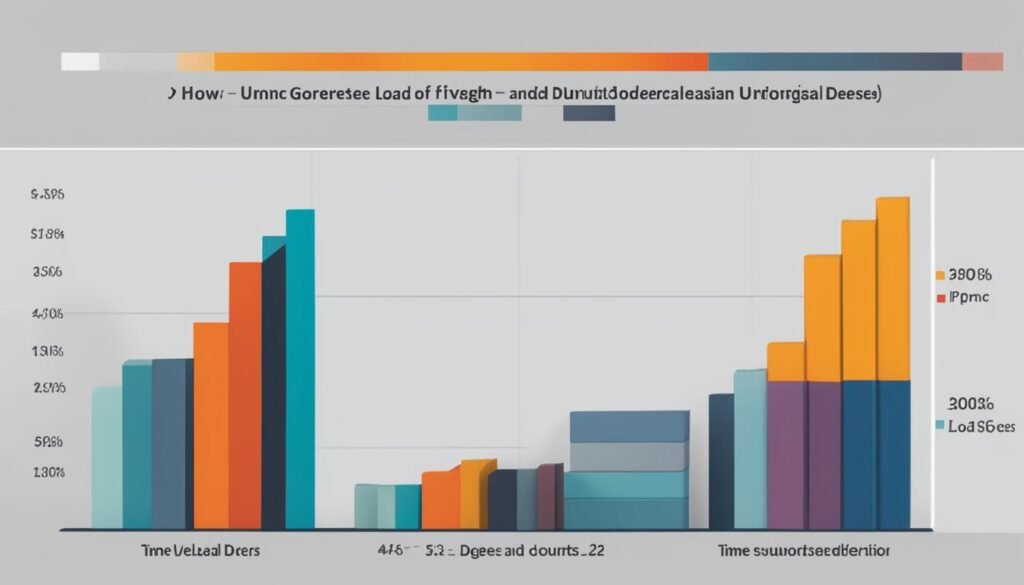Undergraduate vs Graduate Choosing the right educational path can be a crucial decision in shaping your future. Understanding the differences between undergraduate and graduate degrees is essential when embarking on your higher education journey. Whether you’re considering pursuing an undergraduate degree or thinking about advancing your studies with a graduate degree, it’s important to have a clear understanding of what each entails.
An undergraduate degree is the first step in higher education, typically leading to either an associate’s or a bachelor’s degree. It provides a broad foundation of knowledge and allows students to explore different majors while fulfilling general education requirements. On the other hand, a graduate degree is pursued after completing an undergraduate degree and focuses on specialized studies within a specific field. It offers advanced training, expertise, and specialized knowledge.
By exploring the key differences between undergraduate and graduate degrees, you can make an informed decision about which educational path aligns with your goals, aspirations, and future career prospects.
Key Takeaways:
- An undergraduate degree is the first step in higher education, leading to either an associate’s or a bachelor’s degree.
- Undergraduate programs provide a broad foundation of knowledge, allowing students to explore different majors and fulfill general education requirements.
- Graduate degrees are pursued after completing an undergraduate degree and offer specialized studies within a specific field.
- Graduate programs provide advanced training, expertise, and specialized knowledge.
- Understanding the differences between undergraduate and graduate degrees is crucial when considering your educational path and future career prospects.
What are Undergraduate Programs?
Undergraduate programs are the foundation of higher education, providing students with the opportunity to pursue associate’s or bachelor’s degrees. These programs typically span four to five years, offering students the chance to explore various majors, fulfill general education requirements, and even select minors. During their undergraduate studies, students acquire a broad foundation of knowledge while also specializing in their chosen field through a major.
Exploring Major and Minor Options
One of the significant advantages of undergraduate programs is the flexibility they offer in terms of majors and minors. Students have the freedom to explore different areas of interest before choosing a major, allowing them to discover their passions and align their studies accordingly. Additionally, they can select a minor, which is a secondary area of academic focus. Minors complement the major and can provide a well-rounded education.
Fulfilling General Education Requirements Undergraduate vs Graduate
Undergraduate programs also include general education requirements, which consist of courses outside of the chosen major. These requirements expose students to a wide range of disciplines, ensuring they acquire a broad knowledge base. General education courses often cover subjects like mathematics, natural sciences, humanities, social sciences, and communication skills. These foundational courses enhance critical thinking, communication, and problem-solving abilities.
Undergraduate programs offer a combination of exploration and specialization, empowering students to gain a broad foundation of knowledge while focusing on their areas of interest through majors and minors.
A Visual Representation of Undergraduate Programs:
| Associate’s Degree | Bachelor’s Degree | |
|---|---|---|
| Duration | 2 years | 4 years |
| Majors | Specialized | Specialized |
| Minors | Optional | Optional |
| General Education Requirements | Some | Significant |
What is a Graduate Degree?

A graduate degree is an advanced academic qualification obtained after completing an undergraduate degree. It signifies a higher level of expertise and specialization in a specific field. Graduate programs offer in-depth knowledge and skills that allow students to delve deeper into their chosen discipline.
There are several types of graduate degrees available, including master’s degrees, doctoral degrees, and professional degrees. Each degree offers unique opportunities for further education and career advancement.
Master’s Degree
A master’s degree is a postgraduate program that typically requires one to two years of study beyond a bachelor’s degree. It provides a deeper understanding of a specific subject area and allows students to acquire advanced skills and knowledge. Many master’s degree programs require students to complete a research-based thesis or a capstone project to demonstrate their proficiency in the field.
| Types of Master’s Degrees | Description |
|---|---|
| Master of Arts (M.A.) | Focuses on humanities, social sciences, and fine arts subjects. |
| Master of Science (M.S.) | Emphasizes scientific and technical subjects. |
| Master of Business Administration (MBA) | Designed for individuals seeking advanced business and management skills. |
| Master of Education (M.Ed.) | Geared towards individuals pursuing careers in education. |
Doctoral Degree
A doctoral degree is the highest level of academic achievement. It is a research-focused program that typically takes three to seven years to complete, depending on the field of study and the student’s pace. Doctoral programs require students to conduct original research and produce a dissertation, which represents a significant contribution to the field. Graduates with a doctoral degree are recognized as experts in their chosen area of specialization.
Professional Degrees
Professional degrees are specialized graduate programs designed for specific professions, such as law, medicine, or business. These programs combine academic coursework and practical training to prepare students for professional practice. Examples of professional degrees include Juris Doctor (J.D.), Doctor of Medicine (M.D.), and Master of Business Administration (MBA).
Whether pursuing a master’s degree, doctoral degree, or professional degree, graduate studies allow individuals to gain advanced knowledge, develop critical thinking skills, and expand career opportunities. The specialized studies and research conducted during graduate programs contribute to advancements in various fields and industries.
The image above illustrates the pursuit of a graduate degree, representing the culmination of advanced studies and specialized knowledge.
Key Differences Between Undergraduate and Graduate

When considering your educational path, it’s essential to understand the key differences between undergraduate and graduate degrees. These differences encompass education levels, focus of study, job opportunities, program duration, and attendance requirements.
Education Levels:
An undergraduate degree is the initial step in higher education, providing a broad foundation of general knowledge. It includes associate’s and bachelor’s degrees, allowing students to explore various subjects before specializing in a major. On the other hand, a graduate degree follows the completion of an undergraduate degree and offers advanced specialization in a particular field.
General Knowledge vs. Specialization:
Undergraduate degrees provide a well-rounded education, covering a range of subjects and providing a general overview of a profession. In contrast, graduate degrees focus on specific areas of expertise, allowing individuals to specialize and become highly skilled in a particular field.
Job Opportunities:
Undergraduate degrees create entry-level job opportunities, providing a foundation to start a career. However, a graduate degree opens up more advanced and specialized job prospects, offering positions with higher salaries and greater responsibilities.
Program Duration:
Undergraduate programs typically take four to five years to complete, depending on the specific degree and course load. In contrast, graduate programs can vary significantly in length depending on the degree pursued. Master’s programs generally take one to two years, while doctoral programs can take anywhere from three to seven years.
Attendance Requirements:
Undergraduate programs typically require regular attendance in classes and lectures. Graduate programs, on the other hand, may have different attendance requirements, with some emphasizing research and independent study rather than regular class attendance.
Undergraduate degrees provide a solid foundation, whereas graduate degrees offer specialized knowledge and expertise. Depending on your career goals and aspirations, choosing the right educational path is crucial.
Now that we’ve explored the key differences between undergraduate and graduate degrees, it’s important to understand the specific admission requirements for each. Section 5 will delve into the admission criteria necessary for both undergraduate and graduate programs.
Admission Requirements

When it comes to pursuing higher education, understanding the admission requirements for undergraduate and graduate programs is essential. The specific criteria for admission differ between these two levels of study, ensuring that aspiring students meet the necessary qualifications for their chosen academic path.
For undergraduate admissions, the primary requirement is a high school diploma or its equivalent. Additionally, standardized test scores, such as the SAT or ACT, are typically required to evaluate a student’s academic aptitude. Admissions offices also ask applicants to complete an application form, providing personal information, educational background, and other relevant details.
On the other hand, graduate admissions necessitate a previously earned bachelor’s degree from an accredited institution. Standardized tests such as the GRE or GMAT are typically required as well, serving as indicators of a prospective student’s readiness for the rigor of graduate-level study. Letters of recommendation from professors or professionals in the field, which attest to the applicant’s capabilities, are also commonly requested. Additionally, a statement of purpose that outlines the candidate’s academic and professional objectives is typically part of the application process.
Meeting the admission requirements for both undergraduate and graduate programs is crucial for gaining acceptance into the desired academic programs. These requirements ensure that students have the necessary foundation and qualifications to succeed in their chosen course of study, whether they are embarking on an undergraduate degree or advancing their education with a graduate degree.
“The admission requirements for undergraduate and graduate programs play a crucial role in maintaining the academic standards of institutions and ensuring that students are adequately prepared for the demands of their chosen program.”
To visualize the distinct admission requirements for undergraduate and graduate programs, refer to the following table:
| Admission Requirements | Undergraduate | Graduate |
|---|---|---|
| Education Requirement | High school diploma or equivalent | Bachelor’s degree from an accredited institution |
| Standardized Test Scores | SAT or ACT | GRE or GMAT |
| Letters of Recommendation | Not typically required | Often required |
| Statement of Purpose | Not typically required | Often required |
As depicted in the table above, the admission requirements for undergraduate and graduate studies differ significantly. It is crucial for prospective students to carefully review and fulfill these requirements to increase their chances of admission to their desired academic programs.
Duration and Course Load

The duration and course load differ between undergraduate and graduate programs. When pursuing an undergraduate degree, students typically take around 5-7 courses per semester or trimester. This course load is equivalent to 15-21 credits, allowing students to explore various subjects and fulfill general education requirements. Associate’s degree programs generally take two years to complete, while bachelor’s degree programs usually span four years of full-time study.
On the other hand, graduate programs have a different course load structure. The typical load for graduate students is around 4 courses or 12 credits per semester or trimester. This reduced course load allows for more in-depth study and specialization in a specific field. The duration of graduate programs, however, varies based on the degree pursued. Master’s degree programs can last anywhere from 1 to 3 years, while doctoral degrees may take 3 to 7 years to complete.
Comparison of Course Load and Duration
| Program | Course Load | Duration |
|---|---|---|
| Undergraduate | 5-7 courses per semester/trimester | 2-4 years |
| Associate’s Degree | 5-7 courses per semester/trimester | 2 years |
| Bachelor’s Degree | 5-7 courses per semester/trimester | 4 years |
| Graduate | 4 courses per semester/trimester | 1-7 years (based on degree) |
Note: The duration of graduate programs may vary based on part-time or full-time study, as well as program requirements. Additionally, some graduate programs may follow a trimester-based academic calendar rather than a traditional semester system.
Understanding the course load and duration of undergraduate and graduate programs is essential when planning your higher education journey. Consider your academic goals, time availability, and desired field of study to make an informed decision.
Tuition Costs
When considering higher education, one of the crucial factors to take into account is the cost. Tuition costs for undergraduate and graduate programs can vary significantly depending on the type of institution and residency status.
- Public Colleges/Universities: Public institutions generally have lower tuition fees compared to private ones. This makes them an attractive option for students seeking affordable education.
- Private Colleges/Universities: Private institutions typically have higher tuition fees due to factors such as smaller student populations and specialized programs.
Tuition Costs for Undergraduate Programs
For undergraduate programs, the tuition fees can vary based on the degree pursued and the institution chosen. Here’s an overview of the range of tuition costs:
| Type of Degree | Tuition Range |
|---|---|
| Associate’s or 2-Year Degree | $3,000+ |
| 4-Year Degree at a Public College/University (In-State) | $8,000+ |
| 4-Year Degree at a Public College/University (Out-of-State) | $20,000+ |
| 4-Year Degree at a Private College/University | $31,000+ |
Note: The figures mentioned above are approximate and can vary based on the institution and other factors.
Tuition Costs for Graduate Programs
Graduate programs generally have higher tuition fees compared to undergraduate programs. Here’s an overview of the range of tuition costs for graduate studies:
| Type of Institution | Tuition Range |
|---|---|
| Public College/University | $30,000+ |
| Private College/University | $40,000+ |
Note: The figures mentioned above are approximate and can vary based on the institution and the specific graduate program.
In summary, understanding the tuition costs associated with undergraduate and graduate programs is crucial for planning your educational journey. Consider your budget, financial aid opportunities, and future goals when evaluating the cost of tuition.
GPA Requirements

When it comes to pursuing undergraduate and graduate studies, GPA requirements play a vital role in the admissions process. Here’s an overview of the minimum GPAs typically expected:
GPA Requirements for Undergraduate Studies
For undergraduate admissions, a 3.0 GPA is generally considered average. However, it’s important to note that top schools, such as Ivy League institutions, may set higher standards. These elite schools often require a minimum GPA of 3.75 for admission.
GPA Requirements for Graduate Studies
Graduate school admissions commonly require a minimum GPA of 3.0-3.3, although specific programs may have higher standards. As with undergraduate studies, maintaining a good GPA is crucial for your academic journey and future opportunities.
Table: Comparison of GPA Requirements for Undergraduate and Graduate Studies
| Undergraduate Studies | Graduate Studies | |
|---|---|---|
| Minimum GPA | 3.0 (average) – 3.75 (Ivy League) | 3.0-3.3 (general) – Higher for specific programs |
As you can see, the GPA standards differ between undergraduate and graduate programs. It’s essential to maintain a strong academic record to increase your chances of admission. Remember, your GPA is not the only factor considered, but it does carry weight in the application process.
Online and In-Person Options

In recent years, online education has become increasingly popular for both undergraduate and graduate programs. Universities are now offering a wide range of online options, including undergraduate programs and master’s degrees. This provides students with the flexibility to balance their education with work or personal responsibilities.
Online programs offer the convenience of studying from anywhere, allowing students to pursue their degrees without the need for in-person classes. This flexibility is especially beneficial for those who have other commitments but still want to further their education.
However, it’s important to note that while online programs offer a majority of coursework online, some programs may still require in-person attendance for specific activities such as practical labs, internships, or networking events. It’s essential for students to consider these requirements when choosing an online program.
“Online education provides the flexibility that many students need to pursue their academic goals while managing other aspects of their lives.” – Jane Johnson, Education Expert
Despite this, online education has proven to be a reliable and effective alternative to traditional in-person classes. It allows students to access high-quality education from reputable institutions, often at their own pace. Online programs often utilize advanced technologies and interactive learning platforms to facilitate student engagement and collaboration.
For those considering undergraduate programs or master’s degrees, online education offers a convenient and flexible option that can be tailored to fit individual needs. Whether it’s completing coursework on weekends or attending virtual lectures during evenings, online programs provide the necessary flexibility without compromising the quality of education.
Understanding the real difference between graduate and undergraduate studies is crucial for those navigating the academic landscape. The key differences lie in the type of degree pursued, with undergraduate degrees such as associate’s, bachelor’s, and certain graduate programs requiring a high school diploma for admission.
Graduate studies encompass master’s and doctoral programs, requiring a prior undergraduate degree for admission. While undergraduate studies are typically the first level of higher education, graduate students have already earned their undergraduate degree and delve into more specialized and research-oriented coursework. There are important distinctions in admission requirements between undergraduate and graduate programs, as many graduate programs may necessitate a higher minimum GPA.
Graduate courses often demand a deeper level of research and expertise compared to undergraduate courses, and earning a graduate degree signifies a higher level of academic achievement and specialization. Whether you’re considering undergraduate or graduate studies, understanding the similarities and significant differences between these two levels of education is essential for making informed decisions about your academic and professional future.
Entering the academic realm, aspiring students embark on a journey that spans several years into an undergraduate program, during which they encounter common admission requirements for graduate schools. A crucial aspect of this undergraduate program is research, as research in an undergraduate program sets the foundation for the pursuit of either undergraduate or graduate degrees.
The undergraduate program is typically comprised of two types of undergraduate degrees, and admission to graduate programs often hinges on successfully completing the necessary undergraduate studies. The transition from undergraduate to graduate is marked by specific admission requirements for graduate school, with many graduate programs requiring students to possess a high school diploma and a minimum undergraduate GPA. Notably, graduate degrees are typically known as graduate degrees, and graduate students go through rigorous graduate coursework as part of their academic journey.
The real difference between undergraduate and graduate education lies in the depth and specialization of the coursework, emphasizing the need for a graduate degree for certain career paths. Moreover, graduate programs may also require a graduate-level research component, showcasing the comprehensive nature of graduate school admissions.
In essence, graduate school empowers individuals with advanced knowledge and skills, making a real impact in various fields. Ultimately, the pursuit to get an undergraduate degree opens doors to diverse opportunities, laying the groundwork for those who aspire to further their education and careers in graduate studies.
Also Read : Beyond Equations: Is A PhD In Mathematics The Quantum Leap Your Future Deserves?
Conclusion
Choosing between an undergraduate and a graduate degree is a pivotal decision that can shape your educational path and future career prospects. Understanding the differences between these two levels of higher education is crucial in making an informed choice.
Undergraduate programs provide a solid foundation of knowledge and typically lead to an associate’s or bachelor’s degree. They offer a wide range of courses and allow you to explore different majors while fulfilling general education requirements. This breadth of education prepares you for entry-level positions in various fields.
On the other hand, graduate programs specialize in a specific field and offer advanced training and expertise. Pursuing a graduate degree opens up opportunities for specialization and can lead to more advanced and specialized job roles. Master’s and doctoral degrees are common options for those looking to further their education beyond the undergraduate level.
Ultimately, the decision to pursue an undergraduate or graduate degree depends on your interests, goals, and future aspirations. Consider the level of specialization you desire and the career prospects that each degree offers. Whether you choose to start with an undergraduate degree or proceed directly to a graduate program, higher education provides the necessary knowledge and skills for a successful career.
FAQs
Q: What is the difference between an undergraduate and a graduate degree?
A: An undergraduate degree is a bachelor’s degree typically obtained after completing a 4-year program at a college or university, while a graduate degree is a higher-level degree obtained after completing a master’s or doctoral program.
Q: What does an undergraduate degree mean?
A: An undergraduate degree signifies the completion of a bachelor’s program and the attainment of a basic level of education in a specific field of study.
Q: What does a graduate degree mean?
A: A graduate degree refers to the completion of a higher-level academic program, typically at the master’s or doctoral level, signifying advanced education and specialization in a particular area.
Q: Is there a difference between graduate and undergraduate schools?
A: Yes, undergraduate schools offer bachelor’s degree programs, while graduate schools provide master’s and doctoral programs for students who already hold an undergraduate degree.
Q: What is the importance of the differences between undergraduate and graduate schools?
A: Understanding the distinctions between undergraduate and graduate schools is essential for students to make informed decisions about their educational paths and career goals.
Q: What degree programs are typically offered at undergraduate schools?
A: Undergraduate schools offer bachelor’s degree programs in various fields such as liberal arts, sciences, engineering, business, and more.
Q: What type of students pursue undergraduate degrees?
A: Undergraduate students are individuals who have completed high school education and are seeking to obtain their first post-secondary degree at a college or university.
Q: Are there similarities between programs across different institutions for undergraduate degrees?
A: Yes, there are similarities in undergraduate degree programs across institutions, but specific coursework and requirements may vary based on the school and program.
Q: Can I get a graduate degree without first completing an undergraduate degree?
A: Typically, to pursue a graduate degree, individuals are required to have completed an undergraduate degree as a prerequisite for admission to a graduate program.
Q: What is the main difference between an undergraduate and a postgraduate degree?
A: An undergraduate degree is obtained at the bachelor’s level, while a postgraduate degree is achieved at the master’s or doctoral level, signifying a higher level of education and specialization.
Source Links
- https://www.dictionary.com/e/undergraduate-vs-graduate/
- https://www.diffen.com/difference/Graduate_vs_Undergraduate
- https://www.evergladesuniversity.edu/blog/whats-the-difference-between-undergraduate-and-graduate-degrees/




